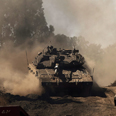
Regional Goliath still deadly
Op-ed: Anti-Israel forces in Sinai, Syria and Lebanon are less visible but just as committed to Jewish state's destruction
How did Israel shift from being the Middle Eastern David to the regional Goliath? When talking to people in Europe, North America or the Near East, the perception is that the Israeli Defense Forces are so superior to their enemies and adversaries that they no longer represent a weak state of approximately 7.5 million people threatened by virtually every nation surrounding it.
Since the first intifada, there is a tendency to look at Israel as a military giant in a region of crippled armies and ragged militias. If the technological and structural superiority of the Israeli military is not to be questioned, the previously stated judgment is likely to lead to strategic miscalculations, as the new security paradigm that is likely to emerge from the shifts occurring in the Middle East will not favor the security of the Jewish State.
The giant is no longer represented by a multitude of conventional armies led by governments, presidents and kings. Goliath finds today his home in the grey zones left unchecked by weak and failing states. He is bred in the heart of a generation that is as much frustrated by his own government as it is hateful towards Israel. The direct and close enemy is no longer made of armored divisions and assault aircraft, but of a radicalized youth that may not care about strategic victories as long as it inflicts unsustainable damages.
Israel may well be effectively surrounded in the two coming years. The northern border is already under the threat of an emboldened Hezbollah, whose arsenal has been fed by an Iranian imperialist foreign policy. The Party of God is now able to stage both pinpoint missile strikes and inaccurate rocket barrages. It is in possession of high performance anti-tank, anti-aircraft and anti-ship weaponry and is in the process of infiltrating and controlling the main Lebanese power structures. In addition to Hezbollah, Hamas remains a constant threat with its harassing rocket and mortar fire.
If the two self-proclaimed "resistance" movements have been a stable part of the terrorist threat to Israel in the last three decades, recent developments increase the number of variables present in the security equation. A virtually unchallenged presence of al-Qaeda operatives and radical elements in the Sinai Peninsula, backed by an increased visibility of the Egyptian society’s belligerence toward Israelis, is rapidly turning the Sinai into a staging area for offensive raids against the southern border.
Unconfirmed reports indicate that since the fall of Colonel Gaddafi, heavy weaponry and possibly a small number of Scud-B missiles have been transported by regional jihadi networks to the Sinai region. The most likely developments consist of an escalation in low intensity harassment of Israeli security personnel and terrorist attacks targeting civilians inside Israeli territory. Such a situation creates a difficult equilibrium as the Israeli Defense Forces struggle to devise a strategy in which they could effectively pursue and deter enemies using the Egyptian territory as an operating base.
The much debated increase in al-Qaeda and local Jihadi involvement in the Syrian crisis is expected to spur further concerns. As soon as the regime will effectively lose its grip over the country, competing factions are likely to battle for domestic and regional recognition. Such a process will without any doubt include attempts to attack Israel. A day after Assad's regime collapses, the northern border will experience the same situation the southern border has known for a years. The increased presence of foreign fighters with improved weaponry and a need to prove themselves, along with Israel's dilemma regarding how to respond to the threat without starting a regional conflict, will define the domestic security paradigm in the short to medium term.
A third and last point concerns the existence of a safe haven for terrorist movements and organizations. In the past, the direct enemies of Israel could be crushed on the battlefield, as there was virtually only a border to cross. The more significant role played by Iran and especially by the Al Quds Brigades in fostering, training, financing and arming terrorist organizations worldwide with the sole intent to weaken Israel effectively provides the Jewish State’s enemies with a rear base which cannot be truly damaged unless international actions are taken.
After the Arab awakening and the subsequent changes the whole region is undergoing, Israel is still David, surrounded by forces which are not only are committed to fight it but are acquiring the necessary capabilities and manpower to do so. Goliath is today less visible and no longer protected by armor and a shield, and he may not be as tall as imagined, but he remains just as deadly and dangerous to the Jewish State. This new security paradigm requires original strategic thinking and the innovative spirit and faith that enabled David to beat Goliath with five stones and a sling shot.
Riccardo Dugulin holds a Master degree from the Paris School of International Affairs (Sciences Po) and is specialized in International Security. He is currently working in Paris for a Medical and Security Assistance company. He has worked for a number of leading think tanks in Washington DC, Dubai and Beirut.
Personal website: www.riccardodugulin.com










